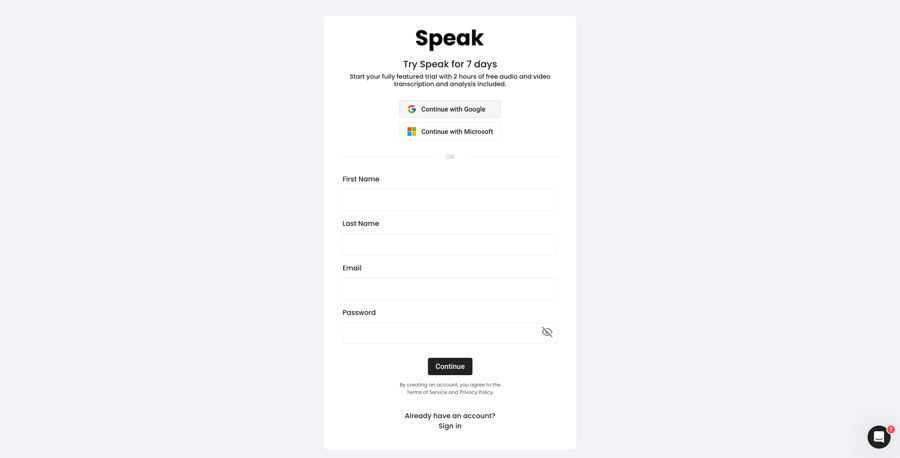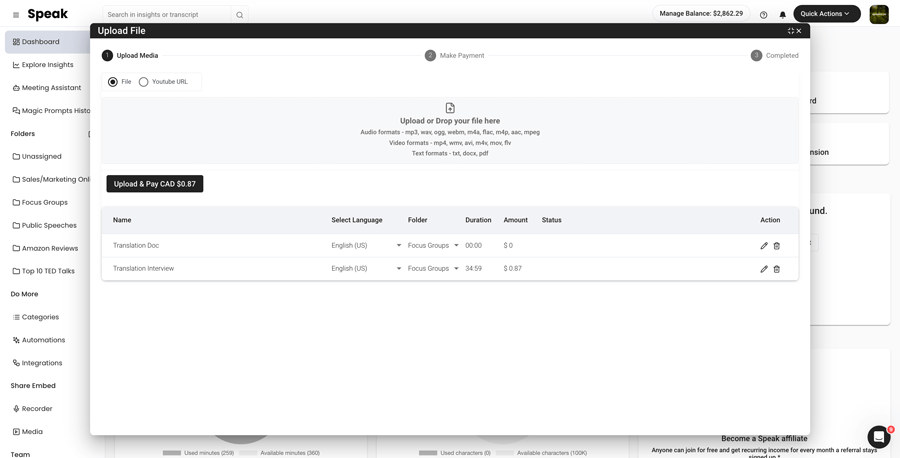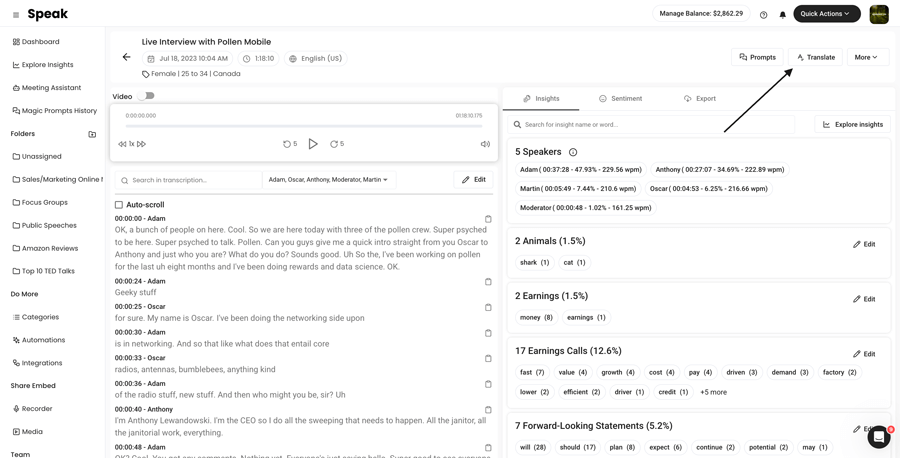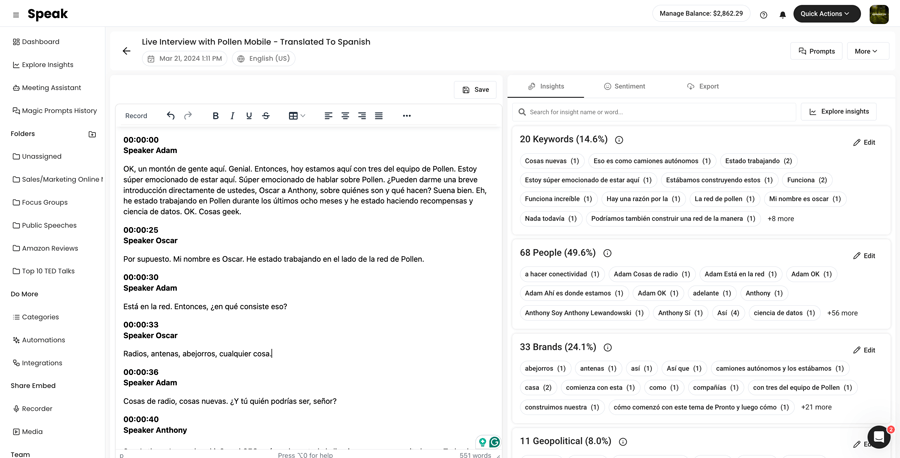How To Translate Japanese to Afrikaans
Translating Japanese to Afrikaans is super simple!

Step 1: Register for Speak
Register for Speak using this link.
Once you register, you can instantly begin translating your Japanese to Afrikaans file(s).

Step 2: Upload Your Japanese file(s)
As soon as you log in, you will be redirected to the dashboard.
Once there, you can select the Quick Action "New Upload".
In Speak, you can seamlessly upload, transcribe and translate audio, video and text files all at once!

Step 3: Translate Your Japanese file(s) to Afrikaans
Once the file is uploaded, simply visit your file and select "Translate".
If it is an audio and video file, Speak will ask you if you want to keep the speaker names and timestamps in the translation.
Want to translate many files at once? No problem!
You can view the files you want to automatically translate from Japanese to Afrikaans from the folder level and instantly translate as many files as you need with our artificial intelligence translation in just a few clicks.

Step 4: That's It! View, Analyze, Modify & Export Your New Afrikaans file(s)
Once the translation is done, you will be alerted and you will see a new document in the same folder your original file is in.
The file will be named the same but with a dash indicating that it is the translated version.
Need support with your Japanese translation?
We are always here and happy to help at Speak!
Just send us a message on live chat on the bottom right corner and we will ensure you are set up for success.
Interested in translating Japanese or other languages to different languages? View our entire list of supported translation languages here.
Automatic, accurate, instant AI translation from Japanese to Afrikaans is here for you.
Register for Speak using this link and begin translating Japanese to Afrikaans today.
Unlocking New Opportunities: Translate Japanese to Afrikaans with AI
In today's globalized world, the ability to communicate across linguistic barriers is more valuable than ever. With the rise of advanced technologies, the task of translating languages like Japanese and Afrikaans has become not only possible but also incredibly efficient. Speak AI leverages the power of natural language processing (NLP) and artificial intelligence (AI) to offer seamless Japanese to Afrikaans translation, transforming the way researchers and businesses connect with new markets and cultures.
The Evolution of Language Translation Technology
Language translation has undergone a remarkable transformation, moving from manual, time-consuming efforts to the swift, automatic translations powered by AI. Speak AI is at the forefront of this revolution, utilizing large language models and data visualization to convert audio, video, and text from Japanese to Afrikaans accurately and contextually.
For Researchers
- Access to Diverse Information Sources: By translating Japanese research papers, articles, and databases into Afrikaans, researchers can uncover new insights and foster innovative discoveries.
- Inclusive Studies: AI translation enables researchers to include diverse linguistic groups in their studies, enhancing the richness and inclusivity of their work.
For Businesses
- Market Expansion: Translating product information, websites, and marketing materials from Japanese to Afrikaans can open up new markets in Afrikaans-speaking regions, driving growth and revenue.
- Customer Satisfaction: By offering services in customers’ native languages, businesses significantly improve user experience, leading to higher engagement and loyalty.
Benefits of AI-Assisted Japanese to Afrikaans Translation
Speak AI's translation services are not only about converting text from one language to another; they are about creating connections and understanding. The benefits include:
Accuracy and Context
Our AI algorithms are trained to understand the nuances of both Japanese and Afrikaans, ensuring translations are accurate and retain the original message's context and tone.
Time and Cost Savings
Automatic translation significantly reduces the time and financial resources required to translate documents, making it a cost-effective solution for businesses and researchers alike.
Scalability
Whether you need to translate a single document or thousands of pages, Speak AI's platform scales to meet your needs without compromising quality or speed.
Exploring Japanese and Afrikaans: A Cultural and Linguistic Journey
Japanese and Afrikaans: Distinct Roots and Rich Histories
Japanese and Afrikaans are languages steeped in history, each offering a unique perspective on the cultures from which they originate.
Locations and Popularity
Japanese is primarily spoken in Japan, a country known for its rich cultural heritage and technological advancements. With over 125 million speakers, Japanese is a significant player on the global stage. Afrikaans, on the other hand, is spoken predominantly in South Africa and Namibia, with around 7 million native speakers. It is a language born from Dutch settlers, infused with influences from Malay, Portuguese, and indigenous African languages.
Fun Facts
- Japanese writing system encompasses three scripts: Kanji, Hiragana, and Katakana, each serving different functions in the language.
- Afrikaans is considered one of the youngest major languages in the world, having evolved from 17th-century Dutch to become officially recognized in the 20th century.
Differences and Similarities
While Japanese and Afrikaans may seem worlds apart, they share a universal trait: the ability to evolve and adapt over time.
Differences
- Structural Complexity: Japanese follows a subject-object-verb (SOV) order, unlike Afrikaans, which, similar to English, typically uses a subject-verb-object (SVO) structure.
- Phonetics: Japanese has a smaller range of sounds compared to Afrikaans, making pronunciation and listening comprehension aspects significantly different between the two.
Similarities
- Linguistic Adaptability: Both languages have absorbed words and phrases from other languages, demonstrating their dynamic nature and adaptability.
- Use of Honorifics: While distinct in application, both Japanese and Afrikaans use forms of honorifics to convey respect and social hierarchy.
Speak AI: Bridging Language Gaps, Connecting Worlds
At Speak AI, we're not just about translating languages; we're about connecting people and ideas, regardless of linguistic barriers. With our advanced AI Meeting Assistant, integration with major platforms like Microsoft Teams, Zoom, Google Meet, and Webex, and a 4.9 rating on G2 from over 150K users, we are transforming the way the world communicates.
By translating Japanese to Afrikaans, we open new doors for collaboration, understanding, and growth across diverse fields. Whether you're a researcher looking to explore new academic landscapes or a business eager to tap into uncharted markets, Speak AI is your partner in breaking down linguistic barriers and unlocking potential.
Experience the future of language translation with Speak AI. Sign up today and take the first step towards new possibilities.
FAQs
What locations are Japanese and Afrikaans popular?
Japanese is primarily spoken in Japan, while Afrikaans is prevalent in South Africa and Namibia. Together, these languages connect communities with over 132 million speakers worldwide.
What are some fun facts about Japanese and Afrikaans?
Japanese boasts a unique writing system composed of three scripts, while Afrikaans is celebrated as one of the youngest major languages in the world, evolving into its current form in just a few centuries.
What are the differences and similarities between Japanese and Afrikaans?
Despite their distinct roots, both languages showcase adaptability, incorporating elements from various languages over time. While they differ in structure and phonetics, Japanese and Afrikaans both enrich the linguistic tapestry of our world, making their translation not just a technical task, but a cultural bridge.
Translate Japanese To These Other Supported Languages:
- Translate Japanese-to-Arabic (Egypt)
- Translate Japanese-to-Arabic (Iraq)
- Translate Japanese-to-Arabic (Israel)
- Translate Japanese-to-Arabic (Jordan)
- Translate Japanese-to-Arabic (Kuwait)
- Translate Japanese-to-Arabic (Lebanon)
- Translate Japanese-to-Arabic (Oman)
- Translate Japanese-to-Arabic (Palestinian Authority)
- Translate Japanese-to-Arabic (Qatar)
- Translate Japanese-to-Arabic (Saudi Arabia)
- Translate Japanese-to-Arabic (Syrian Arab Republic)
- Translate Japanese-to-Arabic (United Arab Emirates)
- Translate Japanese-to-Arabic Modern Standard (Bahrain)
- Translate Japanese-to-Armenian
- Translate Japanese-to-Bulgarian
- Translate Japanese-to-Catalan
- Translate Japanese-to-Chinese (Cantonese, Traditional)
- Translate Japanese-to-Chinese (Simplified)
- Translate Japanese-to-Chinese (Traditional)
- Translate Japanese-to-Croatian
- Translate Japanese-to-Czech
- Translate Japanese-to-Danish
- Translate Japanese-to-Dutch
- Translate Japanese-to-English
- Translate Japanese-to-English (Australia)
- Translate Japanese-to-English (India)
- Translate Japanese-to-English (Ireland)
- Translate Japanese-to-English (New Zealand)
- Translate Japanese-to-English (Scottish)
- Translate Japanese-to-English (South African)
- Translate Japanese-to-English (United Kingdom)
- Translate Japanese-to-English (United States)
- Translate Japanese-to-Estonian
- Translate Japanese-to-Farsi
- Translate Japanese-to-Finnish
- Translate Japanese-to-French
- Translate Japanese-to-French (Canada)
- Translate Japanese-to-German
- Translate Japanese-to-German (Swiss)
- Translate Japanese-to-Greek
- Translate Japanese-to-Gujarati
- Translate Japanese-to-Hebrew
- Translate Japanese-to-Hindi
- Translate Japanese-to-Hungarian
- Translate Japanese-to-Icelandic
- Translate Japanese-to-Indonesian
- Translate Japanese-to-Irish
- Translate Japanese-to-Italian
- Translate Japanese-to-Japanese
- Translate Japanese-to-Kannada
- Translate Japanese-to-Korean
- Translate Japanese-to-Latvian
- Translate Japanese-to-Lithuanian
- Translate Japanese-to-Malay
- Translate Japanese-to-Malayalam
- Translate Japanese-to-Norwegian
- Translate Japanese-to-Persian
- Translate Japanese-to-Polish
- Translate Japanese-to-Portuguese
- Translate Japanese-to-Portuguese (Brazilian)
- Translate Japanese-to-Portuguese (Portugal)
- Translate Japanese-to-Romanian
- Translate Japanese-to-Russian
- Translate Japanese-to-Slovak
- Translate Japanese-to-Slovenian
- Translate Japanese-to-Spanish
- Translate Japanese-to-Spanish (Mexico)
- Translate Japanese-to-Swedish
- Translate Japanese-to-Tamil
- Translate Japanese-to-Telugu
- Translate Japanese-to-Thai
- Translate Japanese-to-Turkish
- Translate Japanese-to-Ukrainian
- Translate Japanese-to-Vietnamese



